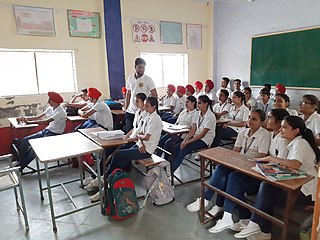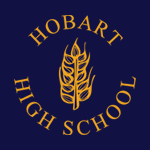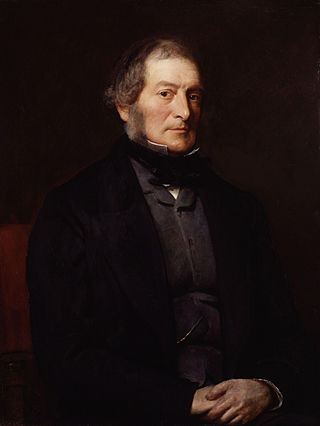
Education in India is primarily managed by state-run public education system, which fall under the command of the government at three levels: central, state and local. Under various articles of the Indian Constitution and the Right of Children to Free and Compulsory Education Act, 2009, free and compulsory education is provided as a fundamental right to children aged 6 to 14. The approximate ratio of public schools to private schools in India is 7:5.
Education in England is overseen by the United Kingdom's Department for Education. Local government authorities are responsible for implementing policy for public education and state-funded schools at a local level.
This article provides an overview of education in Wales from early childhood to university and adult skills. Largely state funded and free-at-the-point-of-use at a primary and secondary level, education is compulsory for children in Wales aged five to sixteen years old. It differs to some extent in structure and content to other parts of the United Kingdom, in the later case particularly in relation to the teaching of the Welsh language.

Broxburn is a town in West Lothian, Scotland. It is 12 miles (19 km) from the West End of Edinburgh, 5 miles (8.0 km) from Edinburgh Airport and 5 miles (8.0 km) to the north of Livingston. Originally a village known as Easter Strathbock in the medieval period, by 1600, the village had become known as Broxburn. The area developed rapidly during the Victorian era as a result of industralisation related to shale oil extraction. While much of the industry in the area is now diminished, the town has continued to grow following new residential development, resulting in Broxburn forming a conurbation with neighbouring Uphall.

Uphall is a village in West Lothian, Scotland. It is a swiftly growing village in a conurbation with Broxburn to the east, Dechmont to the west and the major town of Livingston to the south west. Uphall is 30 miles from Glasgow and 14 miles from Edinburgh in the Scottish Lowlands. Uphall Station and Pumpherston are separate villages that lie to the south of Uphall.

In education, a curriculum is broadly defined as the totality of student experiences that occur in the educational process. The term often refers specifically to a planned sequence of instruction, or to a view of the student's experiences in terms of the educator's or school's instructional goals. A curriculum may incorporate the planned interaction of pupils with instructional content, materials, resources, and processes for evaluating the attainment of educational objectives. Curricula are split into several categories: the explicit, the implicit, the excluded, and the extracurricular.

The New England Conservatory of Music (NEC) is a private music school in Boston, Massachusetts. It is the oldest continuously operating independent music conservatory in the United States and among the most prestigious in the world. The conservatory is located on Huntington Avenue along the Avenue of the Arts near Boston Symphony Hall, and is home to approximately 750 students pursuing undergraduate and graduate studies, and 1,500 more in its Preparatory School and School of Continuing Education. NEC offers bachelor's degrees in instrumental and vocal classical music performance, contemporary musical arts, composition, jazz studies, music history, and music theory, as well as graduate degrees in collaborative piano, conducting, and musicology. The conservatory has also partnered with Harvard University and Tufts University to create joint double-degree, five-year programs and provide students access to Boston's premier academic resources.

A comprehensive school typically is a secondary school for pupils aged approximately 11–18, that does not select its intake on the basis of academic achievement or aptitude, in contrast to a selective school system where admission is restricted on the basis of selection criteria, usually academic performance. The term is commonly used in relation to England and Wales, where comprehensive schools were introduced as state schools on an experimental basis in the 1940s and became more widespread from 1965. They may be part of a local education authority or be a self governing academy or part of a multi-academy trust.
The National Curriculum for England was first introduced by the Education Reform Act 1988. At the time of its introduction the legislation applied to both England and Wales. However, education later became a devolved matter for the Welsh government. The National Curriculum is a set of subjects and standards used by primary and secondary schools so children learn the same things. It covers what subjects are taught and the standards children should reach in each subject.

Education in Bangladesh is overseen by the country's Ministry of Education. The Ministry of Primary and Mass Education is responsible for implementing policy for primary education and state-funded schools at a local level. In Bangladesh, all citizens must undertake ten years of compulsory education which consists of five years at primary school level and five years at high school level. Primary and secondary education is financed by the state and free of charge in public schools.

Smithdon High School is a small comprehensive school academy, with 627 students in Hunstanton, Norfolk. Its buildings are Grade II* listed. It changed its status, joining the West Norfolk Academies Trust in 2016. Ofsted rated the school as 'requires improvement' in 2019.
Key Stage 1 is the legal term for the two years of schooling in maintained schools in England and Wales normally known as Year 1 and Year 2, when pupils are aged between 5 and 7. This Key Stage normally covers pupils during infant school, although in some cases this might form part of a first or primary school. It is also the label used for the third and fourth years of primary education in Northern Ireland. In Hong Kong, it is used to describe Primary One to Primary Three.

Our Lady's Catholic College (OLCC) is a mixed sex secondary school for pupils aged 11–18. It is located in Skerton, just off the A6 road, north of the River Lune, Lancaster in the North West of England. Formerly Our Lady's Catholic High School, it changed its name after being awarded Specialist Sports College status in September 2003. The college teaches Key Stage 3 and Keystage 4 and a sixthform. The sixth form is part of the North Lancashire Learning Partnership, with Carnforth High School and Central Lancaster High School.

Ivybridge Community College is a state-funded secondary school and academy in Ivybridge, Devon, England. Located on the southern slopes of Dartmoor, it takes students from the surrounding 100 square miles (260 km2) of the South Hams, from 14 contributory primary schools.

Hobart High School is a coeducational secondary school with academy status, situated in the village of Loddon, near Norwich in Norfolk, England. It typically has around 850 pupils.
Loxford School is a mixed all-through school with academy status located in the Ilford area of the London Borough of Redbridge, England. The school's current headteacher is Anita Johnson. The secondary school now has more than 3000 students aged from 11 to 18 years, and a primary school is connected to it. The school is a part of the Loxford School Trust which consists of 6 other academies.
The Kampala International School (KISU) is an international school in Kampala, Uganda, located in the neighborhood of Bukoto. It was formerly named Kabira International School of Uganda.

Oasis Academy Shirley Park is a mixed all-through school located within the Ashburton Learning Village complex in the Woodside area of Croydon, Greater London, England.

The Fakenham Academy is a coeducational secondary school and sixth form located at Field Lane Fakenham, Norfolk, England. The school offers GCSEs and BTECs as programmes of study. Pupils in the sixth form can choose to study from a range of A Levels and BTECs.

Science education in England is generally regulated at all levels for assessments that are England's, from 'primary' to 'tertiary' (university). Below university level, science education is the responsibility of three bodies: the Department for Education, Ofqual and the QAA, but at university level, science education is regulated by various professional bodies, and the Bologna Process via the QAA. The QAA also regulates science education for some qualifications that are not university degrees via various qualification boards, but not content for GCSEs, and GCE AS and A levels. Ofqual on the other hand regulates science education for GCSEs and AS/A levels, as well as all other qualifications, except those covered by the QAA, also via qualification boards.














